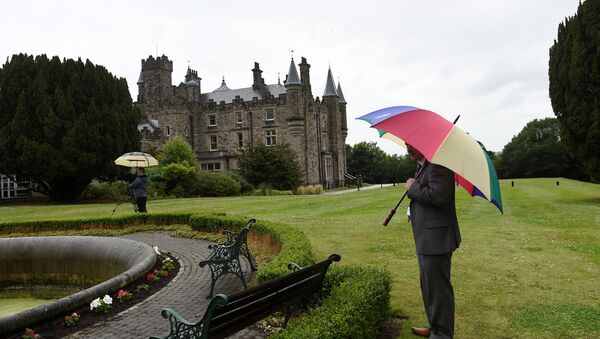News of the deal, entitled 'New Decade, New Approach', was announced by Northern Ireland Secretary of State Julian Smith and Irish Deputy Prime Minister Simon Coveney at Stormont on Thursday evening.
Mr Smith wrote to the Stormont Assembly speaker calling for a meeting to discuss the agreement, while stating the deal would transform public services and help the devolved government build trust amongst the public.
He also urged all parties to back the agreement, stating that it was "decision time" and that there was "something in this deal for everyone".
The news comes as healthcare workers launched massive strikes in December over low wages and short staff levels deemed "unsafe".
Accepting the deal would help bring a "commitment to immediately ending" the strikes, a press release from the North Ireland Office said on late Thursday.
— David Young (@DavidYoungPA) January 10, 2020
It added: "The parties have committed to measures which will end ongoing industrial action by healthcare staff immediately. This includes pay parity, a new action plan on waiting times and delivering much needed reforms on health and social care.
Speaking on the matter, Mr Smith said that talks on Friday would be a "moment of truth" for the Good Friday Agreement 1998, adding that it would be a "fair and balanced deal".
— Sam McBride (@SJAMcBride) January 10, 2020
He added: "It immediately ends the health strike, focuses on reforms to health and social care, ensures more sustainable institutions, better politics and greater transparency and a new framework on language, arts and literature.
Simon Coveney said that the new deal was based on "extensive discussions" and work following the "awful murder of Lyra McKee".
Ms McKee was shot in the head during civil unrest at Londonderry last year in April, reportedly by the New Irish Republican Army (IRA).
The deal represented a "fair and balanced package", Mr Coveney said. "There is no need, and no public patience, for more process and more discussions".
The deal also proposes an Irish Language Act aimed at promoting the Gaelic language across the country, which has been slammed as a "sellout" by some and lauded by others.
— Máirtín Ó Muilleoir (@newbelfast) January 10, 2020
— Jon Mac (@jon_macd) January 9, 2020— Orange Order (@OrangeOrder) January 10, 2020
The latest development are efforts made since Stormont's devolved government collapsed in January 2017, amid tensions between Sinn Féin and the Democratic Unionist Party (DUP) rose over a green energy scandal, with subsequent attempts to strike a deal failing in recent years, according to the BBC.
But the 12 December general election saw the DUP lose influence across the country, with former Westminster leader Nigel Dodds and MP for Belfast south, Emma Little-Pengelly losing seats as the party dropped 5.4 percent in its shares of votes compared to 2017. Secretary Smith may be forced to hold a further assembly election in the absence of a deal by 13 January.



